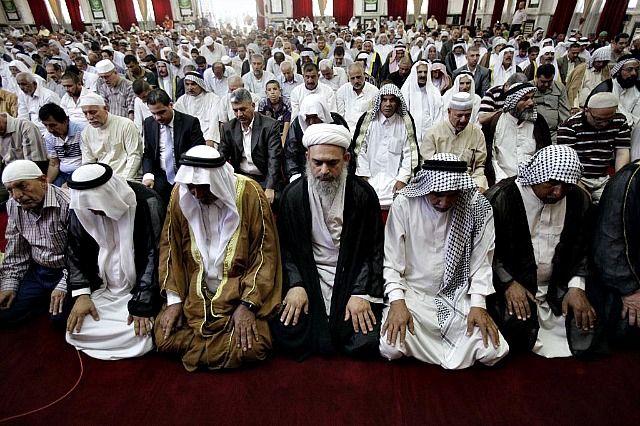Contrary to popular belief, Shia and Sunni Muslims mostly co-exist peacefully in most places around the world today. News media is often dominated by repetitive stories from particular regions in the world describing violence or extremism. However, the fact that such reports are restricted to certain geographic locations proves that the behavior is not as wide spread as it seems.
A recent report from Saudi Arabia described a relatively friendly meeting between members of the Shiite community of Medina and its Salafi governor. According to SaudiShia.com, “The meeting concluded with a speech by the Governor in which he said that ‘it is an honor to visit this tribe’ and he confirmed that he will repeat such social visits in the future.
“This visit is considered as a positive initiative by the new Governor of Medina toward Shiite community. For many decades there has been a tense relation between society and local governors.”
Saudi Arabia media outlet Okaz Newspaper similarly praised Shiite leaders for their attitudes towards nonviolence, indicating a softening of attitudes between the sects.
Elsewhere, in the town of Hangu, Pakistan local Sunni and Shiite leaders met at the office of the town’s District Commissioner to iron out details on this years “Muharram” procession held by the town’s Shia Muslims. After the meeting, leaders of both communities pledged to take active steps to avoid sectarian violence.
The Express Tribune recently featured a blog simply entitled “I am a Sunni and I married a Shia” describing humorous anecdotes about inter-sectarian marriages. In what might be a shocking turn of events for the Internet, the comments were mostly positive to the idea, and the majority of responders gave intellectual and reasoned responses to Sunni – Shia relations. Most seemed to favor the idea.
Here in the United States, leaders from several Sunni and Shia Muslim communities and organizations attended the Universal Muslim Association of America’s (UMAA) annual convention to sign an “Intrafaith Code of Unity.”
According to the Muslim Public Affairs Council (MPAC), “The UMAA Convention is one of the largest Shia Muslim gatherings in the U.S. with more than 3,000 people in attendance from all over the country. UMAA is a nonprofit organization created in 2003 with the purpose of advancing the social, economic and political affairs of the Muslim community in America, with a particular focus on the Shia Muslim community.”
The Code of Unity reads in part “As Muslim Americans who live and struggle together in harmony and cohesion, and who agree that the challenges of the future should supersede the problems of the past, we are eager to offer any help and join hands with all those who wish well for our Ummah (community) toward stopping this vicious cycle of violence in the Middle East, which is abhorrent to all Islamic values and principles.”
Iraq, long considered a hotbed of sectarian violence, saw joint Intrafaith prayers held by Sunnis and Shias last year.
Later in the year, Pakistanis replicated the effort in the mosque called Jamia Masjid Gulmarg, which was filled to capacity for the initiative.
Efforts to unite Sunnis and Shiites have great support from the leaders of each sect. In 2007, Shiite Grand Ayatollah Sistani said “Shias should not call Sunnis their brethren, but their ‘souls’. There is no real difference between Shiite and Sunni beliefs, and I am the servant of all Iraqis (either Sunni or Shiite) and love everyone, and this religion [Islam] is the religion of love.”
A few years ago, King Abdullah II bin Al-Hussein, the Sunni ruler of Jordan, released the Amman Message, calling for tolerance and unity in the Muslim world. Since its inception, more than 200 Islamic scholars from approximately fifty countries have joined the call.
This summer, the Brookings Institute and the government of the State of Qatar will be hosting the U.S. Islam World Forum, which will feature Sunni and Shia participants.
According to the Brookings Institute, “The U.S.-Islamic World Forum is designed to bring together leaders in the realms of politics, business, media, academia and civil society from across the Islamic world (including Muslim communities in Africa, Asia, Europe and the Middle East) and the United States. The forum seeks to serve as both a convening body and catalyst for positive action. Therefore, its focus is not on dialogue just for dialogue’s sake, but on developing actionable agendas for government, civil society and the private sector.”
/149
Source: Washington Times

